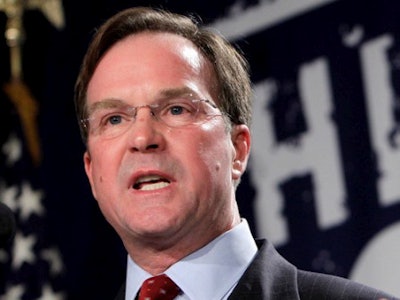 Michigan Solicitor General John Bursch told the Supreme Court on Tuesday that the democratic process had worked in his state.
Michigan Solicitor General John Bursch told the Supreme Court on Tuesday that the democratic process had worked in his state.WASHINGTON — The Supreme Court seemed prepared Tuesday to uphold a voter-approved ban on taking account of race in college admissions.
The court heard arguments over a 2006 change to the state constitution to prohibit the University of Michigan and other state schools from any consideration of race when they decide whom to admit.
The justices’ focus was more on whether they could craft a narrow ruling to uphold Michigan Proposal 2 or would have to overrule earlier cases that protect minorities’ rights to participate in the political process.
Affirmative action supporters say the amendment itself is a form of discrimination because of the burden they face to repeal the constitutional provision.
That argument did not appear to make much headway with the conservative justices, who have been hostile to considerations of race in education and politics in a series of cases in recent years.
Among the skeptics, Chief Justice John Roberts wondered how there could be a problem with voters saying: “We want to take race off the table and achieve diversity without racial preferences.”
Mark Rosenbaum, a lawyer for the American Civil Liberties Union who argued to strike down the Michigan amendment, said that other groups seeking preferential treatment in admissions could lobby policymakers at the schools only race may not be discussed.
“I want the same rule book. I want the same playing field. The problem with Proposal 2 is that it creates two playing fields,” he said.
The case is the court’s second involving affirmative action in as many years. In June, the justices ordered lower courts to take another look at the University of Texas admissions plan in a ruling that could make it harder for public colleges to justify any use of race in admissions.
Affirmative action itself is not before the court in the current dispute, although the case does have its roots in the court’s decision in 2003 that said in a case from Michigan that race could be a factor in college admissions.
Opponents of that decision organized a ballot proposal that passed three years later. The justices heard differing accounts Tuesday of the effects of the ban on diversity on the Michigan campus in Ann Arbor and at other colleges. Supporters of racial preferences say there has been a decline in minority enrollment.
Defending the provision, Michigan Solicitor General John Bursch said the picture is “muddy,” but told the court that the numbers don’t really matter. Bursch acknowledged that affirmative action in education “is one of the most hotly contested issues of our time” and said the democratic process had worked.
Justice Sonia Sotomayor, who has said she benefited from affirmative action at Princeton University and Yale Law School, repeatedly challenged Bursch. “One of the main sponsors of this bill said it was intended to segregate again,” Sotomayor said. How could that be permissible, she wanted to know.
But Bursch said repeatedly that Michigan voters put in place a law that requires equal treatment regardless of race. He said such a provision can’t violate the Constitution’s Equal Protection Clause.
Last year, the 6th U.S. Circuit Court of Appeals in Cincinnati found otherwise and struck down the provision on the grounds that it makes it harder for minorities than any other group to take part in the political process. That outcome seemed unlikely to stand at the high court.
Justice Anthony Kennedy was among the justices who appeared to be searching for a way to uphold the Michigan amendment without also overruling two Supreme Court cases from 1969 and 1982. Those earlier cases struck down voter initiatives that sought to undo anti-discrimination measures in education and housing.
Justice Elena Kagan did not take part in Tuesday’s case because she worked on it while serving in the Justice Department before she joined the court. The Obama administration, which supported Texas’ affirmative action plan last term, is not participating at all in the Michigan case.
A decision is expected by spring.















